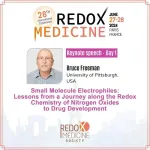(Press-News.org) A new analysis involving over 13,000 people has found changes to blood vessels in the brain that can increase the risk of stroke and dementia are common in people with a range of heart conditions, regardless of whether they have experienced a stroke.
The new research, published today in Neurology®, the medical journal of the American Academy of Neurology, is the most comprehensive systematic review of ‘hidden’ brain changes in people with a range of heart conditions to date.
Lead author Dr Zien Zhou from The George Institute for Global Health said that identifying these changes could play an important role in choosing treatments for these patients.
“Although people with heart disease are two to three times more likely than the general population to have changes in their brain’s vascular system, they’re often overlooked, because these patients don’t routinely undergo brain imaging unless they have suffered a stroke,” he said.
“But it can make them more susceptible to the risk of brain bleeds from medications commonly used to treat or prevent blood clots – intracranial hemorrhage is a life-threatening complication with no proven treatment and a survival rate of less than 50 percent.”
Changes to blood vessels in the brain that can only be detected by brain imaging such as silent brain infarction (SBI) and cerebral small vessel disease (CSVD) are known to occur more commonly in older people or those who have hypertension. While not sufficient to cause obvious neurological symptoms, they can result in subtle neurological deficits and increase the longer-term risk of stroke or dementia.
To determine the prevalence of these hidden or covert cerebrovascular changes in adults with atrial fibrillation, coronary artery disease, heart failure or cardiomyopathy, heart valve disease, and patent foramen ovale (a hole in the heart), George Institute researchers conducted a meta-analysis of 221 observational studies published between 1988 and 2022.
The findings showed that in people with heart disease:
approximately one third had any form of SBI
a quarter had lacune (small cavities where neural tissue has died after a previous blockage or leakage from small arteries)
two-thirds had white matter lesions (damage to the protective coating around nerve fibres)
a quarter had evidence of asymptomatic microbleeds in the brain tissue, and
over one half had brain atrophy (a shrinking of the brain due to loss of neurons or connections between neurons).
The prevalence of these brain changes was generally the same between those with and without a recent stroke and there were no apparent sex differences in the results.
Dr Zhou said the study also confirmed that heart disease is one of the main causes of these changes that reflect brain ‘frailty’.
“While several potential mechanisms of the association between heart disease and hidden cerebrovascular injury have been proposed, the two conditions share common risk factors such as ageing, hypertension, type 2 diabetes, hyperlipidaemia, and smoking,” said Dr Zhou.
“It’s possible that a gradual decline in cardiac output in some patients with heart disease might affect how much blood is reaching the brain tissue, contributing to vascular changes and cognitive dysfunction in these patients,” he added.
“It’s also possible that hidden brain changes and cognitive dysfunction are a consequence of tiny blood clots traveling to the brain through the arterial circulation after forming in the heart.”
Dr Zhou said that more research was needed to look at the exact causes of these brain changes and the implications for managing these patients.
“We need to know whether performing an additional MRI in those considered for anticoagulation therapy - which is required for most people with heart disease - would be cost-effective in terms of preventing unwanted side effects,” he said.
“But refining the risks of brain clots and bleeds from anticoagulants and using this information to make the best treatment choice could improve treatment safety for people with heart disease.”
END
Study finds high prevalence of hidden brain changes in people with heart disease
Detection through imaging could help guide safer individualized treatment choices
2024-03-26
ELSE PRESS RELEASES FROM THIS DATE:
Joints that could heal themselves? Researchers could get there in five years
2024-03-26
Imagine a day when joints could heal themselves.
At the first inkling of a creaky knee, patients could get a single shot in the joint that would not only stop their cartilage and bone from eroding, but kick start its regrowth. In more advanced cases, that shot might also deliver a biomaterial repair kit to patch holes in tissue. If multiple joints ached, an annual IV infusion could ferry regenerating therapies to all of them at once.
This may seem like a dream to the 32.5 million people who suffer from osteoarthritis. ...
Safe viewing of solar eclipses
2024-03-26
On April 8, a total solar eclipse will pass over Mexico, the U.S., and Canada. This JAMA Patient Page describes solar eclipses and how to view them safely. END ...
Flu-vaccine education in the emergency department helps people get their shot
2024-03-26
People who don’t regularly see a primary-care physician, including those from African American and Latinx communities, are more likely to die or need hospitalization from a bout of influenza. They also experience more barriers to vaccine education and care. A new study publishing in the journal NEJM Evidence shows how patient education during an emergency department visit can effectively improve flu-vaccination rates.
“In our earlier study, we saw great success in educating patients about the COVID-19 vaccine during their ED visit – brief messaging videos and educational flyers led to significantly higher COVID-19 vaccine acceptance ...
Analysis of social media language using AI models predicts depression severity for white Americans, but not Black Americans
2024-03-26
Researchers were able to predict depression severity for white people, but not for Black people using standard language-based computer models to analyze Facebook posts. Words and phrases associated with depression, such as first-person pronouns and negative emotion words, were around three times more predictive of depression severity for white people than for Black people. The study, published today in the Proceedings of the National Academy of Sciences, is co-authored by researchers at the University of Pennsylvania, Philadelphia, and the National Institute on Drug Abuse (NIDA), ...
Drs. Thomas Patterson, David Gius accepted into the prestigious Association of American Physicians
2024-03-26
SAN ANTONIO, March 26, 2024 – Thomas Patterson, MD, and David Gius, MD, PhD, two top physician-scientists at The University of Texas Health Science Center at San Antonio (UT Health San Antonio), have been accepted into the prestigious Association of American Physicians for the advancement of scientific and practical medicine.
Patterson is professor of medicine and chief of the Division of Infectious Diseases and vice chair for clinical research for the Department of Medicine in the Joe R. and Teresa Lozano Long School of Medicine, and Gius is associate cancer director of translational research at the Mays Cancer Center and assistant dean of research and ...
Taming the beast: FAMU-FSU researcher controls voltage response for safer electric grid
2024-03-26
When FAMU-FSU College of Engineering Professor Fang Peng was a boy, he saw the power and peril of electricity firsthand.
He was in middle school when his remote Chinese hometown first received electric service. His family shared a single portable, 15-watt light bulb attached to a cable. It was his job to replace the bulb.
“One night, the bulb went out and I tried to change it in total darkness,” Peng said. “I accidentally stuck my left thumb in the socket and was immediately shocked. I got knocked off balance and down to the dirt floor, trembling as the electricity seared through my body. Luckily, my right ...
Professor Bruce Freeman: Keynote Speaker of the 26th International Conference of the Redox Medicine Society
2024-03-26
Bruce A. Freeman, Irwin Fridovich Distinguished Professor and Chair at the University of Pittsburgh School of Medicine Department of Pharmacology & Chemical Biology, will introduce Redox Medicine 2024 with a key note talk titled "Small Molecule Electrophiles: Lessons from a Journey through Studying the Redox Chemistry of Nitrogen Oxides to Drug Development”.
The 26th International Conference of the Redox Medicine, Redox Medicine 2024, will take place on June 27-28 at Fondation Biermans Lapôtre in Paris, France.
Professor Freeman will discuss the generation and actions of nitrogen oxide-derived fatty acid nitroalkenes in the context of ...
Penn Medicine study reveals inequities in access to transformative CAR T cell therapy
2024-03-26
PHILADELPHIA – Patients being treated for B-cell non-Hodgkin’s Lymphoma (NHL) who are part of minority populations may not have equal access to cutting-edge CAR T cell therapies, according to a new analysis led by researchers from the Perelman School of Medicine at the University of Pennsylvania and published today in NEJM Evidence.
CAR T cell therapy is a personalized form of cancer therapy that was pioneered at Penn Medicine and has brought hope to thousands of patients who had otherwise run ...
Artificial reef designed by MIT engineers could protect marine life, reduce storm damage
2024-03-26
The beautiful, gnarled, nooked-and-crannied reefs that surround tropical islands serve as a marine refuge and natural buffer against stormy seas. But as the effects of climate change bleach and break down coral reefs around the world, and extreme weather events become more common, coastal communities are left increasingly vulnerable to frequent flooding and erosion.
An MIT team is now hoping to fortify coastlines with “architected” reefs — sustainable, offshore structures engineered to mimic the wave-buffering effects of natural reefs while also providing pockets for fish and other marine ...
Biotechnology CEO and inventor of SiriusXM Satellite Radio Martine Rothblatt to deliver graduation address to the University of Maryland School of Medicine’s 215th graduating class
2024-03-26
University of Maryland School of Medicine (UMSOM) Dean Mark T. Gladwin, MD, announced today that Martine Rothblatt PhD, JD, MBA, Chairperson and CEO of United Therapeutics, and inventor of SiriusXM Satellite Radio, will deliver the keynote address for this year’s graduating medical student class. The UMSOM MD graduation ceremony will take place at the Hippodrome Theatre on Thursday, May 16, 2024. The ceremony will begin at 1:00 pm. Details for faculty members are here. Details for students/guests are here.
Dr. Rothblatt is a trailblazing pioneer of several innovations in biotechnology, pharmaceuticals, and satellite communications. After developing SiriusXM, ...
LAST 30 PRESS RELEASES:
Ketamine high NOT related to treatment success for people with alcohol problems, study finds
1 in 6 Medicare beneficiaries depend on telehealth for key medical care
Maps can encourage home radon testing in the right settings
Exploring the link between hearing loss and cognitive decline
Machine learning tool can predict serious transplant complications months earlier
Prevalence of over-the-counter and prescription medication use in the US
US child mental health care need, unmet needs, and difficulty accessing services
Incidental rotator cuff abnormalities on magnetic resonance imaging
Sensing local fibers in pancreatic tumors, cancer cells ‘choose’ to either grow or tolerate treatment
Barriers to mental health care leave many children behind, new data cautions
Cancer and inflammation: immunologic interplay, translational advances, and clinical strategies
Bioactive polyphenolic compounds and in vitro anti-degenerative property-based pharmacological propensities of some promising germplasms of Amaranthus hypochondriacus L.
AI-powered companionship: PolyU interfaculty scholar harnesses music and empathetic speech in robots to combat loneliness
Antarctica sits above Earth’s strongest “gravity hole.” Now we know how it got that way
Haircare products made with botanicals protects strands, adds shine
Enhanced pulmonary nodule detection and classification using artificial intelligence on LIDC-IDRI data
Using NBA, study finds that pay differences among top performers can erode cooperation
Korea University, Stanford University, and IESGA launch Water Sustainability Index to combat ESG greenwashing
Molecular glue discovery: large scale instead of lucky strike
Insulin resistance predictor highlights cancer connection
Explaining next-generation solar cells
Slippery ions create a smoother path to blue energy
Magnetic resonance imaging opens the door to better treatments for underdiagnosed atypical Parkinsonisms
National poll finds gaps in community preparedness for teen cardiac emergencies
One strategy to block both drug-resistant bacteria and influenza: new broad-spectrum infection prevention approach validated
Survey: 3 in 4 skip physical therapy homework, stunting progress
College students who spend hours on social media are more likely to be lonely – national US study
Evidence behind intermittent fasting for weight loss fails to match hype
How AI tools like DeepSeek are transforming emotional and mental health care of Chinese youth
Study finds link between sugary drinks and anxiety in young people
[Press-News.org] Study finds high prevalence of hidden brain changes in people with heart diseaseDetection through imaging could help guide safer individualized treatment choices




